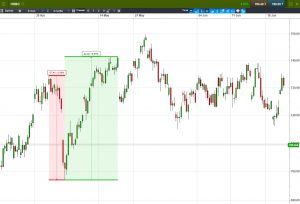This report is not a personal recommendation and does not take into account your personal circumstances or appetite for risk.
 Last week, my colleague Chris spoke about the new quarterly reporting season for US and UK banks. Since then, a few of my clients got in touch to ask how investors can protect themselves ahead of results. My response: don’t just protect yourself on the UK Index , benefit. Here are some of the options traders have.
Last week, my colleague Chris spoke about the new quarterly reporting season for US and UK banks. Since then, a few of my clients got in touch to ask how investors can protect themselves ahead of results. My response: don’t just protect yourself on the UK Index , benefit. Here are some of the options traders have.
One thing many investors should always keep in mind is what happened to UK Banks’ share prices the last time they reported quarterly results. Here you can look back on the previous quarter (if you want to see the latest trend) or, alternatively, on the day reactions to Q2 2017 results, if you want to avoid the seasonality factor.
Barclays shares fell -1.4% on 26 April when Q1 results were announced, and -1.7% on 28 Jul 2017 when previous Q2 earnings were released. Similar picture from Lloyds: shares fell -1.7% the day of Q1 results (25 April) and -2.3% last year (27 Jul 2017).
Shares of HSBC and RBS did rather well a year ago (+1.8% and +2%, respectively), but their Q1 results this year produced share price reactions that also disappointed investors (-1% and -1.5%).
Does the Q2 picture look equally bleak for banking shares? Should investors expect similar price reactions this time around? Keep in mind, historical results aren’t a perfect indication. Traders needs to look at broker previews, examine dividend pay-outs and the overall trading environment to get the full picture. But assuming they expect Bank shares to go down on the day, what’s the next step?
The knee-jerk reaction would be to run for the hills and avoid trading banking shares completely. But avoiding the volatility means missing out on potential trading opportunities, when prudent risk management can shield smart investors even from the most drastic Q2 earnings report. Here are the steps investors can take:
 Have a look at this chart for HSBC’s share price reaction on 4 May (when Q1 results were released). Shares fell to the low of 697p on the day of the quarterly report, but made up all the losses the very next day and rallied back to the high of 738p in 1 week. Not a bad result for investors who took advantage of a bargain trading opportunity.
Have a look at this chart for HSBC’s share price reaction on 4 May (when Q1 results were released). Shares fell to the low of 697p on the day of the quarterly report, but made up all the losses the very next day and rallied back to the high of 738p in 1 week. Not a bad result for investors who took advantage of a bargain trading opportunity.
If you are interested in finding more exciting tradable opportunities like the one with HSBC I described above, go ahead and get in touch with me. It’s pretty simple, just click here to access our research and trade ideas and we can discuss how Bank shares will behave when they report next time.
Dan Masters, Trader at Accendo Markets, 13 July 2018
This research is produced by Accendo Markets Limited. Research produced and disseminated by Accendo Markets is classified as non-independent research, and is therefore a marketing communication. This investment research has not been prepared in accordance with legal requirements designed to promote its independence and it is not subject to the prohibition on dealing ahead of the dissemination of investment research. This research does not constitute a personal recommendation or offer to enter into a transaction or an investment, and is produced and distributed for information purposes only.
Accendo Markets considers opinions and information contained within the research to be valid when published, and gives no warranty as to the investments referred to in this material. The income from the investments referred to may go down as well as up, and investors may realise losses on investments. The past performance of a particular investment is not necessarily a guide to its future performance.
Prepared by Michael van Dulken, Head of ResearchComments are closed.
Accendo Markets is an award-winning provider of CFD and spread betting trading services. We provide an execution-only service.
Telephone calls and online chat conversations may be monitored and recorded for regulatory and training purposes.
* We provide these as underlying assets to CFDs and Spreadbets.
To view our policies and terms, please click here
This website is not intended for or directed at residents of the United States or any country outside the UK. It is not intended for use by or distribution to any person in any jurisdiction or country where its use or distribution would contravene any regulation or local law.
Prices on this page are delayed.
Like many websites, we use cookies for statistical purposes and to acquire information on general internet use. This helps ensure that you get the full benefit of our services, and enhances your browsing experience . For more details on the cookies we use, view our privacy policy under the heading 'How We Use Cookies'. By using this website, we'll assume that you're happy to receive all cookies from Accendo Markets.
Removing cookies may impede the operation of some parts of this website. For general information about cookies and how to remove them, please click here
